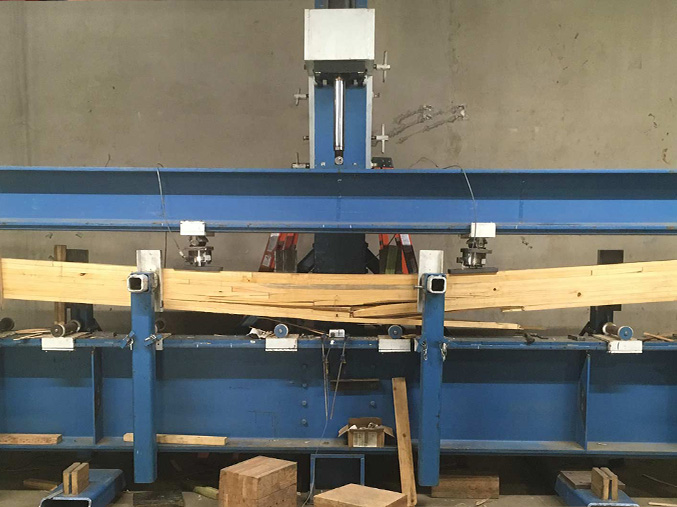ASTM D3043 Bending Strength of Timber Panels
The ASTM D3043 standard is widely used in the building and infrastructure testing sector to determine the bending strength properties of wood and timber panels. This test plays a critical role in ensuring that structural components meet design criteria, thereby enhancing safety and durability. The bending strength measurement provides insights into how timber behaves under stress, which is crucial for constructing robust buildings and infrastructure.
The ASTM D3043 standard specifies the procedures for determining the flexural (bending) properties of wood and wood-based materials using four-point bend tests. This test method involves applying a gradually increasing load until failure occurs in the middle span of the specimen. The results provide engineers with valuable data to evaluate the structural integrity and performance of timber panels.
The testing process begins by selecting appropriate specimens that represent the intended application. Specimens are cut according to specific dimensions outlined in ASTM D3043, ensuring consistency across tests. After preparing the samples, they are mounted on a rigid support system within a universal testing machine (UTM). The test setup ensures accurate and repeatable results.
The loading procedure follows precise guidelines from the standard. A controlled rate of loading is applied to the specimen until it fails under bending stress. The maximum load at failure is recorded, along with any deflection data if specified. This information is used to calculate the flexural strength (Fb) and modulus of rupture (MOR), key parameters in assessing timber quality.
Understanding the results involves interpreting these values within the context of intended applications. For instance, higher MOR indicates greater resistance to bending stress, which is essential for load-bearing structures. Compliance with ASTM D3043 helps ensure that materials meet specific performance requirements, contributing to safer and more reliable buildings and infrastructure.
Incorporating this test into quality management systems enhances overall product reliability by identifying potential weaknesses early in the development process. Compliance officers can use these tests as part of their regulatory compliance strategy, ensuring adherence to international standards.
For R&D engineers, ASTM D3043 provides a standardized approach for evaluating new materials and processes. It enables them to compare different timber types or treatments consistently, facilitating innovation in sustainable building solutions.
The bending strength test is also valuable for procurement departments who need assurance that the timber they purchase meets specified performance levels. By specifying ASTM D3043 compliance, buyers can ensure consistent quality across suppliers and batches.
Applied Standards
| Standard | Description |
|---|---|
| ASTM D3043-18 | This standard specifies the procedures for determining the flexural (bending) properties of wood and wood-based materials using four-point bend tests. |
| EN 14796:2005 | This European standard provides supplementary guidance on how to conduct ASTM D3043 testing, aligning with international practices. |
The use of these standards ensures that the testing methodology is consistent and reliable across different regions and industries. Compliance with these standards not only guarantees accurate test results but also facilitates easier comparison between data sets from various sources.
By adhering to ASTM D3043, laboratories like Eurolab can provide clients with credible and reproducible results, which are essential for maintaining high-quality standards in the building and infrastructure sectors. These tests contribute significantly to the design and construction of safe, durable structures that meet both current codes and future demands.
Eurolab Advantages
At Eurolab, we offer comprehensive ASTM D3043 testing services tailored specifically for wood and timber panels. Our expertise in this area ensures accurate and reliable results every time. With state-of-the-art equipment and experienced technicians, we deliver consistent performance that meets or exceeds industry expectations.
We understand the importance of precision in material testing, particularly when it comes to structural components like timber panels. That's why our laboratory adheres strictly to ASTM D3043 standards, ensuring every test is conducted under controlled conditions using certified instruments. Our facilities are equipped with high-precision universal testing machines capable of handling various specimen sizes and weights.
Our team of qualified professionals ensures that each sample is prepared according to the specified criteria outlined in ASTM D3043. From cutting specimens to mounting them on the testing machine, every step follows strict protocols to maintain consistency and accuracy.
The data generated from our tests is presented clearly and concisely, allowing clients easy interpretation of results. Whether you need basic flexural strength values or detailed deflection curves, we provide comprehensive reports that meet your specific needs.
Choosing Eurolab for your ASTM D3043 testing ensures peace of mind knowing that every aspect of the process—from sample preparation to final report delivery—is handled by experts in the field. Our commitment to quality control and customer satisfaction sets us apart as a premier choice for wood & timber testing services.
Environmental and Sustainability Contributions
The ASTM D3043 standard plays an important role in promoting sustainable practices within the building industry by ensuring that only high-quality, structurally sound timber panels are used. By adhering to this standard during manufacturing processes, manufacturers can reduce waste while maintaining product integrity.
Testing laboratories like Eurolab contribute positively towards environmental sustainability efforts through rigorous adherence to ASTM D3043 standards. Our commitment to precision and accuracy helps identify any flaws early in the production cycle, reducing unnecessary material usage and associated costs.
In addition, our testing services support sustainable development goals by providing data that informs better decision-making regarding material choices. For example, knowing which timber species exhibit superior bending strength allows architects and engineers to make informed decisions about selecting eco-friendly yet robust materials for construction projects.
By embracing ASTM D3043 compliance throughout the supply chain—from raw material sourcing to finished product delivery—Eurolab helps promote responsible forestry practices. This contributes not only to environmental conservation but also supports long-term economic viability by fostering trust among stakeholders who rely on reliable, high-performance structural components.





